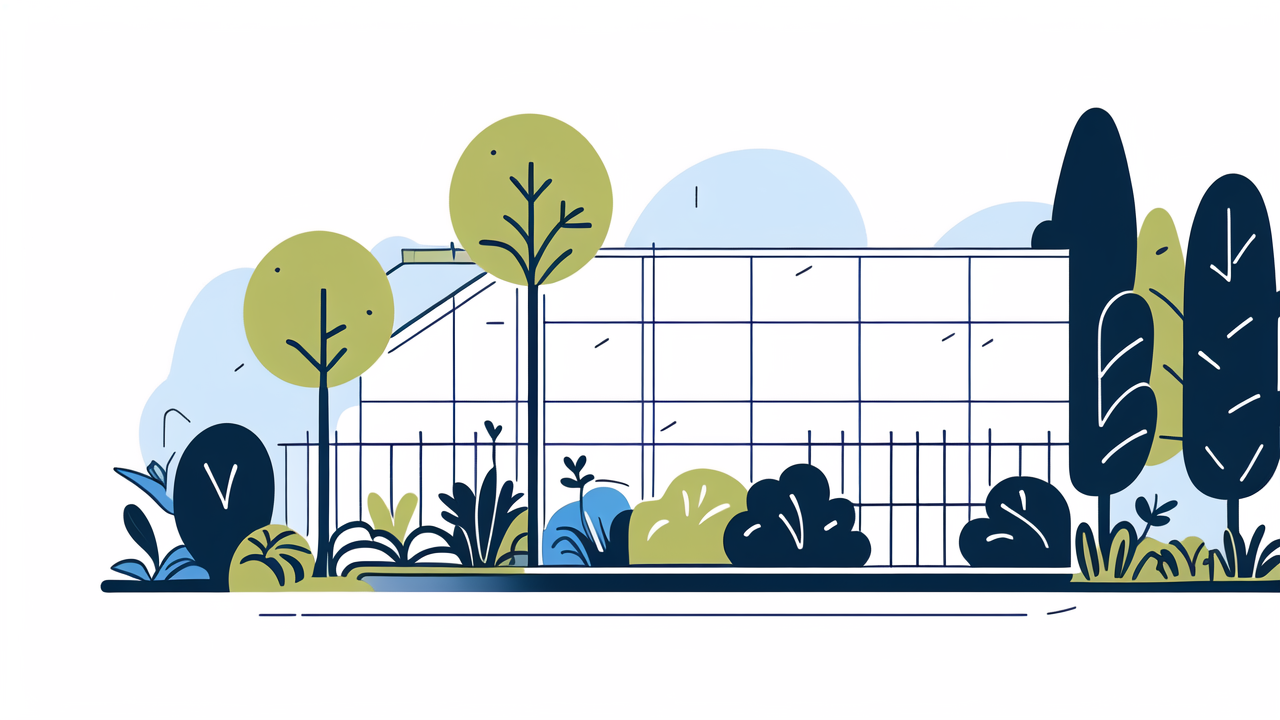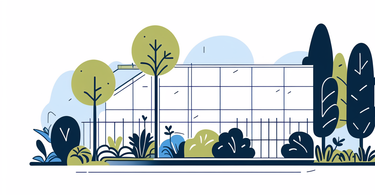Understanding the Role of Black Garden Fences in Landscaping
The Aesthetic Appeal of Black Fences in Garden Design
Black garden fences offer a sleek and modern look to any outdoor space. They create a bold contrast against colorful plants and green lawns. This stark contrast can make your garden pop and stand out. Black fences also provide a neutral backdrop for your landscaping. They allow other elements in your garden to shine.

Black fences can make your outdoor space feel larger. They tend to recede visually, creating an illusion of depth. This can be especially useful in smaller gardens. Black fences also add a touch of sophistication and elegance to your property. They can complement both traditional and contemporary home styles.
In terms of versatility, black fences are hard to beat. They pair well with various design themes. Whether you have a cottage garden or a minimalist landscape, a black fence can enhance the overall look. Black fences also provide a perfect canvas for climbing plants. The dark color makes green foliage and colorful blooms stand out even more.
Functional Benefits of Choosing Black Garden Fences
Beyond aesthetics, black garden fences offer several practical benefits. They provide privacy and security for your outdoor space. A solid black fence can create a secluded retreat in your backyard. It can also deter unwanted visitors and keep pets safely contained.
Black fences are excellent for defining property boundaries. They clearly mark the limits of your garden without being too intrusive. This can be helpful in maintaining good relationships with neighbors. Black fences can also serve as windbreaks, protecting delicate plants from strong gusts.
In terms of maintenance, black fences have an advantage. They don't show dirt and stains as easily as lighter colored fences. This means they can look cleaner for longer periods between washes. Black fences also absorb heat, which can be beneficial in colder climates. This extra warmth can help protect plants near the fence from frost damage.
Key Considerations When Selecting a Black Garden Fence
Assessing Quality and Durability in Black Garden Fences
When choosing a black garden fence, quality and durability should be top priorities. Look for fences made from sturdy materials that can withstand outdoor conditions. Wood, metal, and vinyl are common choices, each with its own pros and cons.

Check the thickness and weight of the fence panels. Heavier, thicker panels often indicate better quality. They're less likely to warp or bend over time. Look at the joints and connections too. Well-made fences have strong, secure joints that won't easily come apart.
Consider the finish on the fence. A high-quality black finish should be even and smooth. It should resist fading, chipping, and peeling. Some fences come with UV-resistant coatings. These can help maintain the deep black color for longer, even in direct sunlight.
Pay attention to the warranty offered. A longer warranty often indicates a manufacturer's confidence in their product. It can also provide peace of mind and potential cost savings in the long run. Remember, a higher upfront cost for a quality fence can save money on repairs and replacements later.
Importance of Material and Maintenance
The material of your black garden fence greatly affects its longevity and maintenance needs. Wood fences offer a classic look but require regular upkeep. They need periodic staining or painting to maintain their black color. Wood can also rot or warp if not properly cared for.
Metal fences, like wrought iron or aluminum, are durable and low-maintenance. They hold their black color well but may rust over time if not properly coated. Regular checks for rust spots and touch-ups can keep them looking great.
Vinyl fences are perhaps the lowest maintenance option. They don't rot, rust, or need painting. However, they may fade over time and can't be repainted. Some higher-end vinyl fences have UV inhibitors to slow fading.
Consider your climate when choosing materials. In wet areas, rust-resistant metals or vinyl might be better choices. In areas with extreme temperature changes, materials that don't expand and contract much are ideal. Your willingness to perform regular maintenance should also factor into your decision.
The Impact of Black Garden Fences on Property Value
Installing a black garden fence can positively impact your property value. It enhances curb appeal, making your home more attractive to potential buyers. A well-maintained fence shows that you care for your property. This can create a good impression on visitors and prospective buyers.
Black fences can make your property feel more private and secure. This is a valuable selling point for many homebuyers. They also define the boundaries of your property clearly. This can prevent future disputes with neighbors over property lines.
However, the impact on property value depends on the quality and condition of the fence. A poorly installed or maintained fence can actually decrease value. It's important to choose a style that complements your home and neighborhood. An overly ornate fence in a simple neighborhood might not add as much value as expected.
Consider the local market and preferences when choosing a fence style. In some areas, privacy fences are highly valued. In others, more open designs might be preferred. Consult with a local real estate agent if you're unsure about what type of fence would add the most value in your area.
Installation and Maintenance Best Practices for Black Garden Fences
Step-by-Step Installation Guide for DIY Enthusiasts
Installing a black garden fence can be a rewarding DIY project. Here's a basic guide to get you started:

- Plan your fence layout. Mark the fence line and post locations.
- Check local regulations and get necessary permits.
- Call utility companies to mark underground lines.
- Dig post holes. They should be about 1/3 the height of the post plus 6 inches for gravel.
- Add gravel to the bottom of each hole for drainage.
- Set posts in concrete. Ensure they're level and plumb.
- Let concrete cure for 24-48 hours.
- Attach fence panels or boards to the posts.
- Install any gates.
- Apply sealant or paint if needed.
Remember, proper installation is key to a long-lasting fence. If you're not confident in your DIY skills, consider hiring a professional. They can ensure your fence is installed correctly and securely.
Routine Maintenance Tips for Long-Lasting Black Garden Fences
Regular maintenance can keep your black garden fence looking great for years. Here are some tips:
- Clean your fence annually. Use a mild soap and water solution for most materials.
- Check for loose screws, nails, or boards. Tighten or replace as needed.
- Look for signs of rot, rust, or damage. Address issues promptly to prevent spreading.
- Touch up paint or sealant as needed. This helps protect the fence from weather damage.
- Trim plants away from the fence. This prevents moisture buildup and potential damage.
- For wooden fences, apply a water-repellent sealant every few years.
- Keep sprinklers aimed away from the fence to reduce water exposure.
Regular inspections can help you catch and fix small issues before they become big problems. A well-maintained fence will last longer and look better throughout its lifespan.
How to Troubleshoot Common Issues with Black Garden Fences
Even with good maintenance, issues can arise. Here's how to handle common problems:
- Fading color: Clean the fence and apply a fresh coat of black paint or stain.
- Rust spots: Sand the area, apply a rust converter, and touch up with paint.
- Warped boards: Replace individual boards as needed. Check for underlying moisture issues.
- Loose posts: Dig around the post, add concrete, and re-set it. Replace if rotted.
- Gaps between boards: Add additional boards or replace warped ones.
- Sagging gates: Adjust or replace hinges. Ensure the post is sturdy.
For any issue you're not comfortable handling, don't hesitate to call a professional. They can often fix problems more quickly and effectively than a DIY approach. Remember, proper care and prompt repairs can significantly extend the life of your black garden fence.
